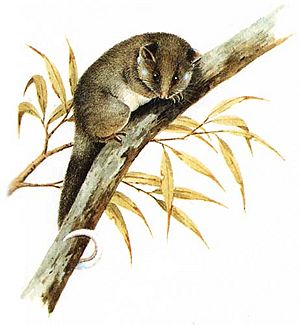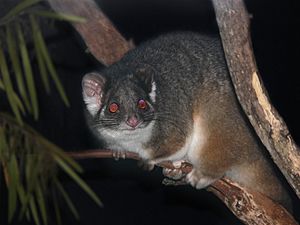Pseudocheiridae facts for kids
Quick facts for kids PseudocheiridaeTemporal range: Late Oligocene to Recent
|
|
|---|---|
 |
|
| Pseudocheirus peregrinus, common ringtail possum | |
| Scientific classification |
|
| Kingdom: | Animalia |
| Phylum: | Chordata |
| Class: | Mammalia |
| Infraclass: | Marsupialia |
| Order: | Diprotodontia |
| Superfamily: | Petauroidea |
| Family: | Pseudocheiridae Winge, 1893 |
| Subfamilies | |
|
|
The Pseudocheiridae are a family of tree-dwelling marsupials. They include 17 different types of ringtail possums and their close relatives. You can find these animals in forests and bushy areas across Australia and New Guinea.
Contents
What Are Ringtail Possums Like?
Ringtail possums look a lot like pygmy possums, but they are bigger. Still, they are fairly small animals. The largest ones are about the size of a cat. They weigh between 200 grams (about 7 ounces) and 2 kilograms (about 4.4 pounds).
These possums have special hands and feet that help them grip branches. Their back feet have a thumb-like first toe that can grab things. Most species also have a prehensile tail. This means their tail can grasp and hold onto branches, acting like an extra hand! The only exception is the greater glider, which doesn't have a prehensile tail.
Ringtail possums are nocturnal. This means they are active at night. They have large eyes that help them see well in the dark.
What Do They Eat?
Almost all ringtail possums eat only leaves. Leaves are tough and full of fiber, so digesting them can be tricky. To help with this, these possums have a special enlarged part of their gut called a cecum. This cecum contains helpful bacteria that break down the leaves.
Like rabbits, ringtail possums are coprophagous. This means they pass their food through their digestive system twice. This helps them get all the nutrients from the tough leaves. Their teeth are also made for eating leaves. They have many grinding molars and no lower canine teeth. Their dental formula is:
| Dentition |
|---|
| 3.1.3.4 |
| 2.0.3.4 |
How Do They Live?
Most ringtail possums live alone. However, a few types live in small family groups. They are generally shy and like to keep to themselves. This makes them quite hard to study in the wild.
They move around in an area called a home range. This area can be up to 3 hectares (about 7.5 acres) in size. When a female possum is pregnant, her Gestation period (how long she carries her babies) can last up to 50 days. The exact time depends on the specific species.
Types of Ringtail Possums
There are 17 different living species of ringtail possums. Scientists group them into three main subfamilies and six genera (which are smaller groups within families).
Hemibelideinae Subfamily
- Genus Hemibelideus
- Lemur-like ringtail possum, Hemibelideus lemuroides
- Genus Petauroides
- Greater glider, Petauroides volans
Pseudocheirinae Subfamily
- Genus Petropseudes
- Rock-haunting ringtail possum, Petropseudes dahli
- Genus Pseudocheirus
- Common ringtail possum, Pseudocheirus peregrinus
- Genus Pseudochirulus
- Lowland ringtail possum, Pseudochirulus canescens
- Weyland ringtail possum, Pseudochirulus caroli
- Cinereus ringtail possum, Pseudochirulus cinereus
- Painted ringtail possum, Pseudochirulus forbesi
- Herbert River ringtail possum, Pseudochirulus herbertensis
- Masked ringtail possum, Pseudochirulus larvatus
- Pygmy ringtail possum, Pseudochirulus mayeri
- Vogelkop ringtail possum, Pseudochirulus schlegeli
Pseudochiropsinae Subfamily
- Genus Pseudochirops
- D'Albertis' ringtail possum, Pseudochirops albertisii
- Green ringtail possum, Pseudochirops archeri
- Plush-coated ringtail possum, Pseudochirops corinnae
- Reclusive ringtail possum, Pseudochirops coronatus
- Coppery ringtail possum, Pseudochirops cupreus
See also
 In Spanish: Pseudoquéiridos para niños
In Spanish: Pseudoquéiridos para niños
 | Percy Lavon Julian |
 | Katherine Johnson |
 | George Washington Carver |
 | Annie Easley |


